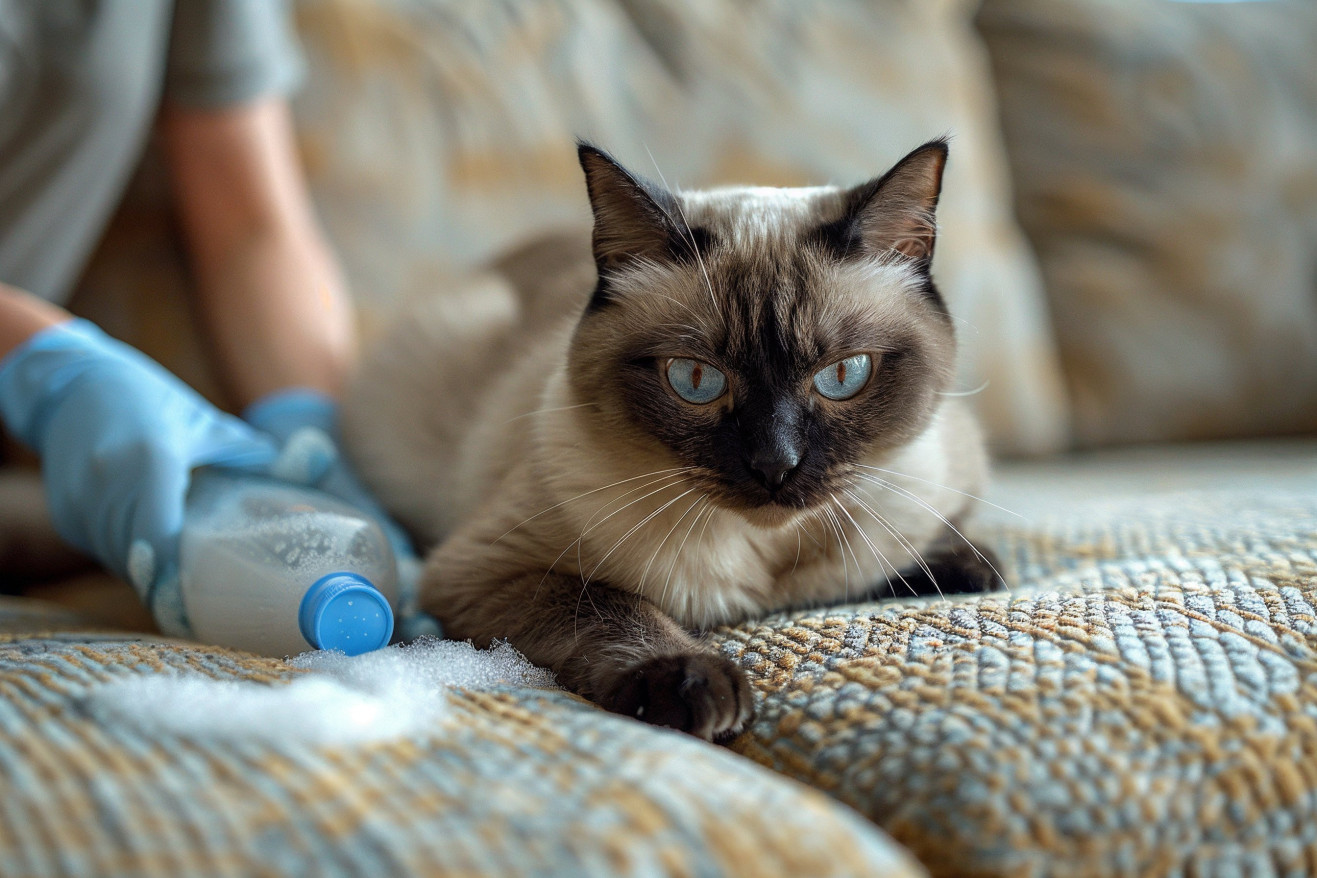How to Get Cat Urine Out of a Couch: A Step-by-Step Guide to Cleaning
5 March 2024 • Updated 4 March 2024

What’s the key to getting rid of that telltale cat urine smell in your couch? To get cat urine out of a couch, you’ll need to start by soaking up as much of the urine as possible with paper towels. Then, use an enzymatic cleaner to break down and neutralize the odor. You can also use a mixture of water and vinegar, which you’ll spray on the area and then cover with baking soda.
From the worlds of home cleaning and animal behavior, we’ll cover a range of solutions and techniques from the science of homemaking, the knowledge of veterinarians, and the insights of the do-it-yourself community.
Our investigation will look at the effectiveness of store-bought enzymatic cleaners, explore natural home solutions, and explain why your cat is peeing on your couch. By the end of this in-depth guide, you’ll have the information you need to not only clean up the mess but also stop it from happening again, leading to a cleaner home and a happier cat.
What are the ways to successfully get cat pee out of a couch?
The Science Behind Enzymatic Cleaners for Cat Urine
Enzymatic cleaners rely on a chemical reaction to combat the potency of cat urine. The enzymes in these cleaners are designed to target and break down the complex proteins, urea, and other organic compounds in cat urine, converting them into smaller, less smelly molecules.
Specific enzymes like protease and urease work on specific urine components like proteins and urea to start the process of breaking them down, according to Origin Labs.
This is followed by non-pathogenic bacteria that eat the smaller molecules, which gets rid of the smell and the stain, leaving your couch looking and smelling as good as new.
In addition to their effectiveness, enzymatic cleaners are also known for being safe and eco-friendly. Enzymatic cleaners are biodegradable and nontoxic, making them a safer alternative to solvent-based cleaners, which can be toxic to pets and the environment, according to Install-It-Direct. Enzymatic cleaners are a safe, effective alternative to traditional cleaning methods that may only temporarily cover up odors or put your pet’s health at risk.
When selecting an enzymatic cleaner, consider the material your couch is constructed from. Some cleaners are formulated for robust materials, while others are suited for gentler upholstery, which can aid in prolonging your furniture’s lifespan. When applied properly, these cleaners can assist in revitalizing your furniture and safeguarding it for the future.
Home Remedies for Cat Urine Removal on Couches
If you don’t have commercial cleaners at your disposal, home remedies can be a convenient and cost-effective way to get cat urine out of your couch. Some of the most common home remedies include vinegar and baking soda.
In general, vets recommend blotting the area with a mixture of vinegar and water and then sprinkling baking soda on the dried stain and vacuuming it up. CNET recommends gently cleaning the area with a mixture of dish detergent, vinegar, and water.
While these DIY solutions are easy to use and often effective, they also have some downsides. For example, as USA TODAY points out, the effectiveness of home remedies can depend on the type of material your couch is made of and how long the urine has been there.
You should always do a spot test on an inconspicuous area to make sure the solution doesn’t harm the material. In addition, make sure to blot the area instead of scrubbing it, which can spread the urine.
In addition, you should always be careful about the products you use in DIY solutions. For instance, you should avoid using ammonia-based cleaners since they can make cats more likely to mark the area again. That said, while home remedies can help you get rid of the problem quickly, it’s also important to make sure you’re addressing your cat’s needs to prevent future accidents.
What It Means When Your Cat Has Bathroom Issues
If your cat has decided that your couch is the perfect place to go to the bathroom, it’s likely not a personal attack. VCA Animal Hospitals says that there are medical reasons for feline inappropriate elimination, but once those have been ruled out, you have to look at psychological reasons.
Cats are creatures of habit, and changes in their environment, like the introduction of a new pet or rearranging furniture, can cause them to become stressed. This stress can lead to them urinating on your couch as a way to destress or mark their territory, according to Just Cats Clinic.
To avoid this, make sure that you’re setting your cat up for success by making sure that their environment is as stress-free as possible. Make sure that the litter box is in a quiet, easy-to-get-to location and that it’s kept clean. PrettyLitter also suggests that in multi-cat households, you should have multiple litter boxes to avoid competition and stress.
It’s also important to work with a vet because VCA Animal Hospitals says that some cats may need medical intervention or behavior modification. It’s also important to be patient and use positive reinforcement instead of punishment to help your cat get back to using the litter box.
In the end, if you make sure that your home is a safe and comfortable place for your cat, you can help them get back to using the litter box and avoid any future accidents on your furniture.
The Long-Term Effects of Cat Pee on Couches
Cat urine is made up of a variety of chemicals, including ammonia, phosphate, sulfate, and uric acid. When cats urinate on couches, they release these chemicals, which can have long-term effects. As the water in the urine evaporates, the chemicals are left behind in a more concentrated form, which can lead to discoloration and the breakdown of fibers, especially in more delicate upholstery.
Bio-One Duval notes that the smell of ammonia—a major component of cat urine—can also become a problem for the couch and the health of the people living in the home.
If the urine isn’t cleaned up quickly, it can penetrate deeply into the couch’s cushions, making it difficult to remove. In addition, if the urine is allowed to seep through the material and padding, it can eventually reach the furniture’s frame, according to Dry Effect Restoration. This can create a damp environment that can attract bacteria and even lead to mold, which can have several adverse health effects.
These deep stains need to be treated with immediate and thorough care. Enzymatic cleaners are great for breaking down the components of urine, but you may need to hire a professional for more severe cases.
As Alpine Clean warns, if you don’t take care of these things, you can end up causing a lot of damage that will require expensive repairs or replacements. Taking care of the problem quickly will ensure that your furniture and living space stay healthy.
Conclusion: The Ultimate Guide to a Pee-Free Couch
As we’ve worked to save the couch from the smell of cat pee, we’ve learned about enzymatic cleaners and how they break down the components of urine on a molecular level, and we’ve also learned about the tried-and-true methods of vinegar and baking soda.
The most important thing to remember is that time is of the essence; the faster you can work to keep the components of cat urine from setting into your couch, the better.
This is true of understanding your cat’s behavior as well as the cleaning process. Stress and other changes in your cat’s environment can lead to your couch becoming a litter box, so make sure you’re doing everything you can to create a safe space for your cat. This will help you avoid future accidents and make for a happier home for everyone. After all, a happy cat makes for a happy owner.
In the end, keeping a clean home while living with our feline friends doesn’t have to be an impossible task. If you’re dealing with ongoing issues or if you find that your home remedies aren’t working, don’t hesitate to ask for help. With the information in this guide, you’re now ready to take on cat urine problems and make sure that your home stays fresh and clean for everyone.


